

The 23 rd of April 1564 460 years William Shakespeare


Desdemona’s willow song in Act 4, scene 3 of Othello

Her hand in her bosom, her head on her knee
‘ Alyonushka’ was created in 1881 by Viktor Vasnetsov

https://www.youtube.com/watch?v=Joj2hdoIq2g Sarah Sturdevant The Willow Song from Shakespeare’s Othello

The poor soul sat sighing by a sycamore tree Singing willow, willow, willow, willow

Her hand in her bosom, her head on her knee Oh willow, willow, willow, willow

She sighed in her singing and made a great moan Singing willow, willow, willow, willow

I'm dead to all pleasure, my true love is gone Oh willow, willow, willow shall be my garland

The fresh streams ran by her and murmured her moans Singing willow, willow, willow, willow

Her salt tears fell from her, and soften'd the stones Oh willow, willow, willow, willow

Come all you forsaken and mourn you with me Singing willow, willow, willow, willow

Who speaks of a false love, mine's falser than he Oh willow, willow, willow, shall be my garland

Let love no more boast him in palace nor bower Singing willow, willow, willow, willow

It buds, but it blasteth ere it be a flower Oh willow, willow, willow, willow

Though fair and more false, I die with thy wound Singing willow, willow, willow, willow

Thou has lost the truest lover that goes upon ground Oh willow, willow, willow, shall be my garland

Let nobody chide him, his scorns I approve Singing willow, willow, willow, willow

He was born to be false and I to die for his love Oh willow, willow, willow, willow

Take this for my farewell, and latest adieu Singing willow, willow, willow, willow

Write this on my tomb, that in love I was true Oh willow, willow, willow, shall be my garland

Othello

Desdemona

Desdemona
![the [ðə] тот, такой, этот, тем](https://fsd.multiurok.ru/html/2024/05/11/s_663e90c990a3e/img25.jpg)
the [ðə] тот, такой, этот, тем
![poor [pʊə(r)] бедный, несчастный](https://fsd.multiurok.ru/html/2024/05/11/s_663e90c990a3e/img26.jpg)
poor [pʊə(r)] бедный, несчастный
![soul [səʊl] душа, дух, сердце, человек](https://fsd.multiurok.ru/html/2024/05/11/s_663e90c990a3e/img27.jpg)
soul [səʊl] душа, дух, сердце, человек
![sat [sæt] сидел](https://fsd.multiurok.ru/html/2024/05/11/s_663e90c990a3e/img28.jpg)
sat [sæt] сидел
![sit [sɪt] сидеть, заседать, находиться, просиживать, стоять, позировать, сажать, усаживать](https://fsd.multiurok.ru/html/2024/05/11/s_663e90c990a3e/img29.jpg)
sit [sɪt] сидеть, заседать, находиться, просиживать, стоять, позировать, сажать, усаживать
![sighing [saɪɪŋ] вздыхая](https://fsd.multiurok.ru/html/2024/05/11/s_663e90c990a3e/img30.jpg)
sighing [saɪɪŋ] вздыхая
![sigh [saɪ] вздыхать, охать, тосковать](https://fsd.multiurok.ru/html/2024/05/11/s_663e90c990a3e/img31.jpg)
sigh [saɪ] вздыхать, охать, тосковать
![by [baɪ] по, на, к, при, у, мимо, согласно, около, рядом с, близко](https://fsd.multiurok.ru/html/2024/05/11/s_663e90c990a3e/img32.jpg)
by [baɪ] по, на, к, при, у, мимо, согласно, около, рядом с, близко
![a [ə] неопределённый артикль, один](https://fsd.multiurok.ru/html/2024/05/11/s_663e90c990a3e/img33.jpg)
a [ə] неопределённый артикль, один
![sycamore [ˈsɪkəmɔː] платан, явор, чинар, чинара, сикамор, клен явор](https://fsd.multiurok.ru/html/2024/05/11/s_663e90c990a3e/img34.jpg)
sycamore [ˈsɪkəmɔː] платан, явор, чинар, чинара, сикамор, клен явор
![tree [triː] дерево, древо, вал, родословное дерево, загнать на дерево, влезать на дерево](https://fsd.multiurok.ru/html/2024/05/11/s_663e90c990a3e/img35.jpg)
tree [triː] дерево, древо, вал, родословное дерево, загнать на дерево, влезать на дерево
![singing [sɪŋɪŋ] напевая](https://fsd.multiurok.ru/html/2024/05/11/s_663e90c990a3e/img36.jpg)
singing [sɪŋɪŋ] напевая
![sing [sɪŋ] петь, спеть, воспевать, ликовать, пение, свист, спевка, шум, звон](https://fsd.multiurok.ru/html/2024/05/11/s_663e90c990a3e/img37.jpg)
sing [sɪŋ] петь, спеть, воспевать, ликовать, пение, свист, спевка, шум, звон
![willow [ˈwɪləʊ] ива, тальник](https://fsd.multiurok.ru/html/2024/05/11/s_663e90c990a3e/img38.jpg)
willow [ˈwɪləʊ] ива, тальник
![her [hə(r] ее, ей, свой, принадлежащий ей](https://fsd.multiurok.ru/html/2024/05/11/s_663e90c990a3e/img39.jpg)
her [hə(r] ее, ей, свой, принадлежащий ей
![hand [hænd] рука (кисть)](https://fsd.multiurok.ru/html/2024/05/11/s_663e90c990a3e/img40.jpg)
hand [hænd] рука (кисть)
![in [ɪn] в, на, по, во, при, с, у, из, внутри, внутрь, связи, влияние](https://fsd.multiurok.ru/html/2024/05/11/s_663e90c990a3e/img41.jpg)
in [ɪn] в, на, по, во, при, с, у, из, внутри, внутрь, связи, влияние
![bosom [ˈbʊz(ə)m] грудь, пазуха, сердце, душа, хранить в тайне, прятать за пазуху](https://fsd.multiurok.ru/html/2024/05/11/s_663e90c990a3e/img42.jpg)
bosom [ˈbʊz(ə)m] грудь, пазуха, сердце, душа, хранить в тайне, прятать за пазуху
![head [hed] голова](https://fsd.multiurok.ru/html/2024/05/11/s_663e90c990a3e/img43.jpg)
head [hed] голова
![on [ɒn] на, по, о, в, об, согласно, левая сторона](https://fsd.multiurok.ru/html/2024/05/11/s_663e90c990a3e/img44.jpg)
on [ɒn] на, по, о, в, об, согласно, левая сторона
![knee [niː] колено, коленка](https://fsd.multiurok.ru/html/2024/05/11/s_663e90c990a3e/img45.jpg)
knee [niː] колено, коленка
![Oh [əʊ] издавать восклицание «о»](https://fsd.multiurok.ru/html/2024/05/11/s_663e90c990a3e/img46.jpg)
Oh [əʊ] издавать восклицание «о»
![she [ʃɪ] она, та, которая, женщина](https://fsd.multiurok.ru/html/2024/05/11/s_663e90c990a3e/img47.jpg)
she [ʃɪ] она, та, которая, женщина
![sighed [saɪd] вздыхала, охала, тосковала](https://fsd.multiurok.ru/html/2024/05/11/s_663e90c990a3e/img48.jpg)
sighed [saɪd] вздыхала, охала, тосковала
![and [ənd] и, а, но, иначе](https://fsd.multiurok.ru/html/2024/05/11/s_663e90c990a3e/img49.jpg)
and [ənd] и, а, но, иначе
![made [meɪd] издавала](https://fsd.multiurok.ru/html/2024/05/11/s_663e90c990a3e/img50.jpg)
made [meɪd] издавала
![make [meɪk] - делать; изготовлять, производить - составлять - создавать, творить](https://fsd.multiurok.ru/html/2024/05/11/s_663e90c990a3e/img51.jpg)
make [meɪk] - делать; изготовлять, производить - составлять - создавать, творить
![great [ɡreɪt] большой, великий](https://fsd.multiurok.ru/html/2024/05/11/s_663e90c990a3e/img52.jpg)
great [ɡreɪt] большой, великий
![moan [məʊn] стон, жалоба, стонать, жаловаться, охать](https://fsd.multiurok.ru/html/2024/05/11/s_663e90c990a3e/img53.jpg)
moan [məʊn] стон, жалоба, стонать, жаловаться, охать
![I [aɪ] я (местоимение)](https://fsd.multiurok.ru/html/2024/05/11/s_663e90c990a3e/img54.jpg)
I [aɪ] я (местоимение)
!['m [əm] 1-е л. ед. ч. настоящего времени гл. be быть, находиться, существовать](https://fsd.multiurok.ru/html/2024/05/11/s_663e90c990a3e/img55.jpg)
'm [əm] 1-е л. ед. ч. настоящего времени гл. be быть, находиться, существовать
![dead [ded] мертвый, умерший](https://fsd.multiurok.ru/html/2024/05/11/s_663e90c990a3e/img56.jpg)
dead [ded] мертвый, умерший
![to [tə] для, к, в, на, до](https://fsd.multiurok.ru/html/2024/05/11/s_663e90c990a3e/img57.jpg)
to [tə] для, к, в, на, до
![all [ɔːl] все, весь, целый, все, целое, все, весь, вся, совершенно, всецело](https://fsd.multiurok.ru/html/2024/05/11/s_663e90c990a3e/img58.jpg)
all [ɔːl] все, весь, целый, все, целое, все, весь, вся, совершенно, всецело
![pleasure [ˈpleʒə] удовольствие, наслаждение, увеселительный](https://fsd.multiurok.ru/html/2024/05/11/s_663e90c990a3e/img59.jpg)
pleasure [ˈpleʒə] удовольствие, наслаждение, увеселительный
![my [maɪ] мой, моя, мое, мои, свой, свое, принадлежащий мне](https://fsd.multiurok.ru/html/2024/05/11/s_663e90c990a3e/img60.jpg)
my [maɪ] мой, моя, мое, мои, свой, свое, принадлежащий мне
![true [truː] истинный, верный, истина, точно, правдиво](https://fsd.multiurok.ru/html/2024/05/11/s_663e90c990a3e/img61.jpg)
true [truː] истинный, верный, истина, точно, правдиво
![love [lʌv] любовь, влюбленность, любить, возлюбить, любовный, возлюбленный](https://fsd.multiurok.ru/html/2024/05/11/s_663e90c990a3e/img62.jpg)
love [lʌv] любовь, влюбленность, любить, возлюбить, любовный, возлюбленный
![is [ɪz] 3-е л. ед. ч. настоящего времени глагола be быть, находиться, составлять, происходить, существовать, равняться, стоить, бывать](https://fsd.multiurok.ru/html/2024/05/11/s_663e90c990a3e/img63.jpg)
is [ɪz] 3-е л. ед. ч. настоящего времени глагола be быть, находиться, составлять, происходить, существовать, равняться, стоить, бывать
![gone [ɡɒn] ушедший, прошедший, уехавший, потерянный](https://fsd.multiurok.ru/html/2024/05/11/s_663e90c990a3e/img64.jpg)
gone [ɡɒn] ушедший, прошедший, уехавший, потерянный
![shall [ʃəl] в 1-м лице выражает волю говорящего, его приказ, обещание - во 2-м и 3-м лице выражает - волю говорящего, его приказ, распоряжение и т. п.: - обещание, угрозу и т. п.: - выражает желательность или обязательность действия: - в текстах законов, соглашений, приказов и т. п. выражает долженствование и часто соответствует настоящему времени: - употребляется в предсказаниях, пророчествах и т. п.: - с личным местоимением 1-го лица выражает решимость: - вспомогательный глагол служит для образования формы будущего времени в 1-м лице в утвердительных и отрицательных предложениях и в 1-м и 2-м лице в вопросительных предложениях](https://fsd.multiurok.ru/html/2024/05/11/s_663e90c990a3e/img65.jpg)
shall [ʃəl] в 1-м лице выражает волю говорящего, его приказ, обещание - во 2-м и 3-м лице выражает - волю говорящего, его приказ, распоряжение и т. п.: - обещание, угрозу и т. п.: - выражает желательность или обязательность действия: - в текстах законов, соглашений, приказов и т. п. выражает долженствование и часто соответствует настоящему времени: - употребляется в предсказаниях, пророчествах и т. п.: - с личным местоимением 1-го лица выражает решимость: - вспомогательный глагол служит для образования формы будущего времени в 1-м лице в утвердительных и отрицательных предложениях и в 1-м и 2-м лице в вопросительных предложениях
![be [bɪ] быть](https://fsd.multiurok.ru/html/2024/05/11/s_663e90c990a3e/img66.jpg)
be [bɪ] быть
![garland [ˈɡɑːlənd] гирлянда, венок, пальма первенства, плести венок, украшать венком](https://fsd.multiurok.ru/html/2024/05/11/s_663e90c990a3e/img67.jpg)
garland [ˈɡɑːlənd] гирлянда, венок, пальма первенства, плести венок, украшать венком
![fresh [freʃ] свежий, новый, недавно, прохлада, половодье, свежеть](https://fsd.multiurok.ru/html/2024/05/11/s_663e90c990a3e/img68.jpg)
fresh [freʃ] свежий, новый, недавно, прохлада, половодье, свежеть
![streams [striːmz] ручьи, реки](https://fsd.multiurok.ru/html/2024/05/11/s_663e90c990a3e/img69.jpg)
streams [striːmz] ручьи, реки
![stream [striːm] поток, ручей, струя, река](https://fsd.multiurok.ru/html/2024/05/11/s_663e90c990a3e/img70.jpg)
stream [striːm] поток, ручей, струя, река
![ran [ræn] бежал](https://fsd.multiurok.ru/html/2024/05/11/s_663e90c990a3e/img71.jpg)
ran [ræn] бежал
![run [rʌn] работать, бежать, управлять, бегать, прогон, работа, бег, пробег, ход, показ, трасса](https://fsd.multiurok.ru/html/2024/05/11/s_663e90c990a3e/img72.jpg)
run [rʌn] работать, бежать, управлять, бегать, прогон, работа, бег, пробег, ход, показ, трасса
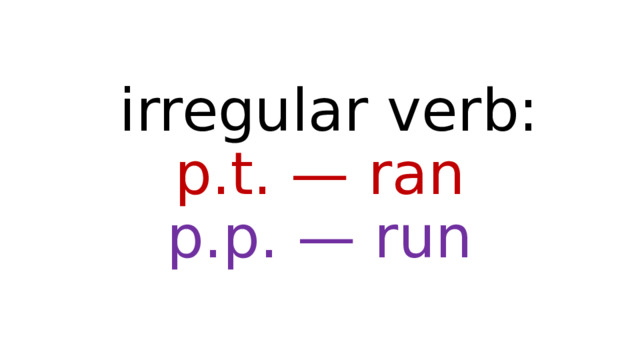
irregular verb: p.t. — ran p.p. — run
![murmured [ˈmɜːməd] шептал, бормотал](https://fsd.multiurok.ru/html/2024/05/11/s_663e90c990a3e/img74.jpg)
murmured [ˈmɜːməd] шептал, бормотал
![murmur [ˈmɜːmə] роптать, бормотать, шептать, журчать, ропот, журчание, шепот, ворчание, шорох](https://fsd.multiurok.ru/html/2024/05/11/s_663e90c990a3e/img75.jpg)
murmur [ˈmɜːmə] роптать, бормотать, шептать, журчать, ропот, журчание, шепот, ворчание, шорох
![moans [məʊnz] стоны](https://fsd.multiurok.ru/html/2024/05/11/s_663e90c990a3e/img76.jpg)
moans [məʊnz] стоны
![salt [sɔːlt] соль, поваренная соль, солить, засаливать, соленый, морской](https://fsd.multiurok.ru/html/2024/05/11/s_663e90c990a3e/img77.jpg)
salt [sɔːlt] соль, поваренная соль, солить, засаливать, соленый, морской
![tears [ˈtɪəz] слёзы](https://fsd.multiurok.ru/html/2024/05/11/s_663e90c990a3e/img78.jpg)
tears [ˈtɪəz] слёзы
![fell [fel] падали](https://fsd.multiurok.ru/html/2024/05/11/s_663e90c990a3e/img79.jpg)
fell [fel] падали
![fall [fɔːl] падение, осень, снижение, спад, выпадение, падать, снижаться, опускаться, впадать](https://fsd.multiurok.ru/html/2024/05/11/s_663e90c990a3e/img80.jpg)
fall [fɔːl] падение, осень, снижение, спад, выпадение, падать, снижаться, опускаться, впадать
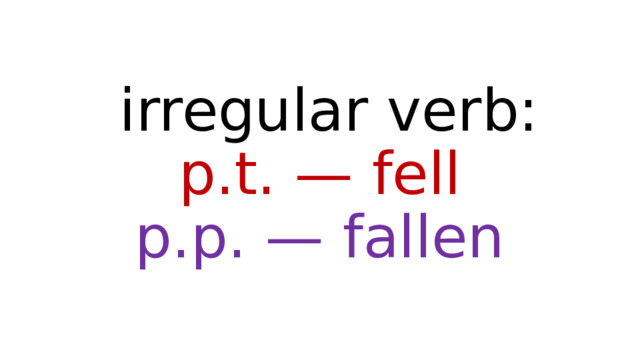
irregular verb: p.t. — fell p.p. — fallen
![from [frəm] от, из, с, судя по](https://fsd.multiurok.ru/html/2024/05/11/s_663e90c990a3e/img82.jpg)
from [frəm] от, из, с, судя по
![soften'd [ˈsɒf(ə)n] расплавляли](https://fsd.multiurok.ru/html/2024/05/11/s_663e90c990a3e/img83.jpg)
soften'd [ˈsɒf(ə)n] расплавляли
![soften [ˈsɒf(ə)n] смягчать, смягчаться, размягчать, размягчаться, мягчить, размякать, мякнуть](https://fsd.multiurok.ru/html/2024/05/11/s_663e90c990a3e/img84.jpg)
soften [ˈsɒf(ə)n] смягчать, смягчаться, размягчать, размягчаться, мягчить, размякать, мякнуть
![stones [stones] камни](https://fsd.multiurok.ru/html/2024/05/11/s_663e90c990a3e/img85.jpg)
stones [stones] камни
![stone [stəʊn] каменный, камень, стоун, камешек, побивать камнями](https://fsd.multiurok.ru/html/2024/05/11/s_663e90c990a3e/img86.jpg)
stone [stəʊn] каменный, камень, стоун, камешек, побивать камнями
![come [kʌm] приходить, приехать, приезжать, прибывать, наступить, происходить, подходить](https://fsd.multiurok.ru/html/2024/05/11/s_663e90c990a3e/img87.jpg)
come [kʌm] приходить, приехать, приезжать, прибывать, наступить, происходить, подходить
![you [ju] вы, вам, вами, вас, ты, тебя, тебе, тобой](https://fsd.multiurok.ru/html/2024/05/11/s_663e90c990a3e/img88.jpg)
you [ju] вы, вам, вами, вас, ты, тебя, тебе, тобой
![forsaken [fəˈseɪkən] покинутый, брошенный](https://fsd.multiurok.ru/html/2024/05/11/s_663e90c990a3e/img89.jpg)
forsaken [fəˈseɪkən] покинутый, брошенный
![forsake [fəˈseɪk] оставлять, отказываться, покидать](https://fsd.multiurok.ru/html/2024/05/11/s_663e90c990a3e/img90.jpg)
forsake [fəˈseɪk] оставлять, отказываться, покидать

irregular verb: p.t. — forsook p.p. — forsaken
![mourn [mɔːn] оплакивать, скорбеть, горевать, печалиться, сетовать, носить траур](https://fsd.multiurok.ru/html/2024/05/11/s_663e90c990a3e/img92.jpg)
mourn [mɔːn] оплакивать, скорбеть, горевать, печалиться, сетовать, носить траур
![with [wɪð] с, вместе с, от, несмотря на](https://fsd.multiurok.ru/html/2024/05/11/s_663e90c990a3e/img93.jpg)
with [wɪð] с, вместе с, от, несмотря на
![me [mɪ] меня, мне, мной, себя](https://fsd.multiurok.ru/html/2024/05/11/s_663e90c990a3e/img94.jpg)
me [mɪ] меня, мне, мной, себя
![who [huː] кто, который, те, кто, тот, кто](https://fsd.multiurok.ru/html/2024/05/11/s_663e90c990a3e/img95.jpg)
who [huː] кто, который, те, кто, тот, кто
![speaks [spiːks] говорит](https://fsd.multiurok.ru/html/2024/05/11/s_663e90c990a3e/img96.jpg)
speaks [spiːks] говорит
![speak [spiːk] говорить, выступать, разговаривать, высказывать(ся), изъясняться](https://fsd.multiurok.ru/html/2024/05/11/s_663e90c990a3e/img97.jpg)
speak [spiːk] говорить, выступать, разговаривать, высказывать(ся), изъясняться
![of [əv] из, от, о, об, для](https://fsd.multiurok.ru/html/2024/05/11/s_663e90c990a3e/img98.jpg)
of [əv] из, от, о, об, для
![false [fɔːls] ложный, фальшивый, неправильный, лживый, ошибочный, искусственный, подставной](https://fsd.multiurok.ru/html/2024/05/11/s_663e90c990a3e/img99.jpg)
false [fɔːls] ложный, фальшивый, неправильный, лживый, ошибочный, искусственный, подставной
![mine [maɪn] мой, моя, мое, мои, шахта, рудник, мина, добывать, минный](https://fsd.multiurok.ru/html/2024/05/11/s_663e90c990a3e/img100.jpg)
mine [maɪn] мой, моя, мое, мои, шахта, рудник, мина, добывать, минный
!['s = is [z] есть, находится, существует](https://fsd.multiurok.ru/html/2024/05/11/s_663e90c990a3e/img101.jpg)
's = is [z] есть, находится, существует
![is [ɪz] есть, находится, существует](https://fsd.multiurok.ru/html/2024/05/11/s_663e90c990a3e/img102.jpg)
is [ɪz] есть, находится, существует
![falser [ˈfɔːlsə] более неверный, более лживый](https://fsd.multiurok.ru/html/2024/05/11/s_663e90c990a3e/img103.jpg)
falser [ˈfɔːlsə] более неверный, более лживый
![than [ðən] чем, кроме, как, чтобы](https://fsd.multiurok.ru/html/2024/05/11/s_663e90c990a3e/img104.jpg)
than [ðən] чем, кроме, как, чтобы
![he [hɪ] он, него, мужчина, водящий](https://fsd.multiurok.ru/html/2024/05/11/s_663e90c990a3e/img105.jpg)
he [hɪ] он, него, мужчина, водящий
![let [let] позволять, давать, препятствовать, препятствие, помеха, сдача внаем](https://fsd.multiurok.ru/html/2024/05/11/s_663e90c990a3e/img106.jpg)
let [let] позволять, давать, препятствовать, препятствие, помеха, сдача внаем
![no [nəʊ] нет, не, никакой, нисколько не, отказ, отрицание](https://fsd.multiurok.ru/html/2024/05/11/s_663e90c990a3e/img107.jpg)
no [nəʊ] нет, не, никакой, нисколько не, отказ, отрицание
![more [mɔː] более, больше, еще, гораздо, больший, дополнительный, большее количество](https://fsd.multiurok.ru/html/2024/05/11/s_663e90c990a3e/img108.jpg)
more [mɔː] более, больше, еще, гораздо, больший, дополнительный, большее количество
![boast [bəʊst] похвастать, хвастать, хвастаться, хвастовство, предмет гордости](https://fsd.multiurok.ru/html/2024/05/11/s_663e90c990a3e/img109.jpg)
boast [bəʊst] похвастать, хвастать, хвастаться, хвастовство, предмет гордости
![palace [ˈpælɪs] дворец, чертог, особняк, роскошное здание, дворцовый](https://fsd.multiurok.ru/html/2024/05/11/s_663e90c990a3e/img110.jpg)
palace [ˈpælɪs] дворец, чертог, особняк, роскошное здание, дворцовый
![nor [nɔː] ни, и ... не, тоже ... не, также ... не](https://fsd.multiurok.ru/html/2024/05/11/s_663e90c990a3e/img111.jpg)
nor [nɔː] ни, и ... не, тоже ... не, также ... не
![bower [ˈbaʊə|] беседка, дача, жилище, будуар, осенять, окружать](https://fsd.multiurok.ru/html/2024/05/11/s_663e90c990a3e/img112.jpg)
bower [ˈbaʊə|] беседка, дача, жилище, будуар, осенять, окружать
![it [ɪt] это, этого, он, она, оно, него, последнее слово, идеал](https://fsd.multiurok.ru/html/2024/05/11/s_663e90c990a3e/img113.jpg)
it [ɪt] это, этого, он, она, оно, него, последнее слово, идеал
![buds [bʌdz] распускается бутон](https://fsd.multiurok.ru/html/2024/05/11/s_663e90c990a3e/img114.jpg)
buds [bʌdz] распускается бутон
![bud [bʌd] бутон, почка, приятель, дружище, крошка, почковаться, развиваться](https://fsd.multiurok.ru/html/2024/05/11/s_663e90c990a3e/img115.jpg)
bud [bʌd] бутон, почка, приятель, дружище, крошка, почковаться, развиваться
![but [bət] но, а, однако, зато, кроме, только, кроме, возражение, кто бы не](https://fsd.multiurok.ru/html/2024/05/11/s_663e90c990a3e/img116.jpg)
but [bət] но, а, однако, зато, кроме, только, кроме, возражение, кто бы не
![blasteth ===blasts [blɑːsts] разрушает](https://fsd.multiurok.ru/html/2024/05/11/s_663e90c990a3e/img117.jpg)
blasteth ===blasts [blɑːsts] разрушает
![blast [blɑːst] взрыв, дутье, звук, взрывная волна, дуть, взрывать, разносить, разрушать](https://fsd.multiurok.ru/html/2024/05/11/s_663e90c990a3e/img118.jpg)
blast [blɑːst] взрыв, дутье, звук, взрывная волна, дуть, взрывать, разносить, разрушать
![ere [eə] прежде чем, скорее чем, до, перед, рано](https://fsd.multiurok.ru/html/2024/05/11/s_663e90c990a3e/img119.jpg)
ere [eə] прежде чем, скорее чем, до, перед, рано
![flower [ˈflaʊə] цветок, цвет, цветение, расцвет, цвести, быть в расцвете](https://fsd.multiurok.ru/html/2024/05/11/s_663e90c990a3e/img120.jpg)
flower [ˈflaʊə] цветок, цвет, цветение, расцвет, цвести, быть в расцвете
![though [ðəʊ] хотя, однако, несмотря на, если бы, однако, все же](https://fsd.multiurok.ru/html/2024/05/11/s_663e90c990a3e/img121.jpg)
though [ðəʊ] хотя, однако, несмотря на, если бы, однако, все же
![fair [feə] справедливый, честный, честно, ясно, чисто, точно](https://fsd.multiurok.ru/html/2024/05/11/s_663e90c990a3e/img122.jpg)
fair [feə] справедливый, честный, честно, ясно, чисто, точно
![die [daɪ] умереть, умирать](https://fsd.multiurok.ru/html/2024/05/11/s_663e90c990a3e/img123.jpg)
die [daɪ] умереть, умирать
![thy [ˈðaɪ] твой, твоя, твое, твои](https://fsd.multiurok.ru/html/2024/05/11/s_663e90c990a3e/img124.jpg)
thy [ˈðaɪ] твой, твоя, твое, твои
![wound [wuːnd] рана, ранение, обида, ущерб, оскорбление, ранить, поранить, причинять боль](https://fsd.multiurok.ru/html/2024/05/11/s_663e90c990a3e/img125.jpg)
wound [wuːnd] рана, ранение, обида, ущерб, оскорбление, ранить, поранить, причинять боль
![thou [ðaʊ] pers pron уст., поэт. ты](https://fsd.multiurok.ru/html/2024/05/11/s_663e90c990a3e/img126.jpg)
thou [ðaʊ] pers pron уст., поэт. ты
![has [həz] иметь, обладать, получать, содержать, испытывать, проводить, знать, родить, говорить](https://fsd.multiurok.ru/html/2024/05/11/s_663e90c990a3e/img127.jpg)
has [həz] иметь, обладать, получать, содержать, испытывать, проводить, знать, родить, говорить
![lost [lɒst] - потерянный, утраченный, пропавший - напрасный; даром потраченный - погибший - заблудившийся - неиспользованный, пропущенный - (in) забывшийся - (to) безразличный - проигранный - поэт. потерпевший поражение, разбитый](https://fsd.multiurok.ru/html/2024/05/11/s_663e90c990a3e/img128.jpg)
lost [lɒst] - потерянный, утраченный, пропавший - напрасный; даром потраченный - погибший - заблудившийся - неиспользованный, пропущенный - (in) забывшийся - (to) безразличный - проигранный - поэт. потерпевший поражение, разбитый
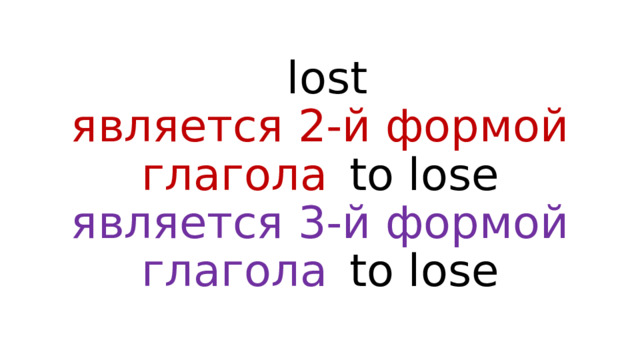
lost является 2-й формой глагола to lose является 3-й формой глагола to lose
![lose [luːz] терять, проигрывать, упускать, утрачивать, лишаться, лишать, забывать, заблудиться](https://fsd.multiurok.ru/html/2024/05/11/s_663e90c990a3e/img130.jpg)
lose [luːz] терять, проигрывать, упускать, утрачивать, лишаться, лишать, забывать, заблудиться
![truest [ˈtruːɪst|] самый верный](https://fsd.multiurok.ru/html/2024/05/11/s_663e90c990a3e/img131.jpg)
truest [ˈtruːɪst|] самый верный
![true [truː] истинный, верный, истина, правдиво](https://fsd.multiurok.ru/html/2024/05/11/s_663e90c990a3e/img132.jpg)
true [truː] истинный, верный, истина, правдиво
![lover [ˈlʌvə] любовник, любитель, возлюбленный, поклонник, друг, приверженец, доброжелатель](https://fsd.multiurok.ru/html/2024/05/11/s_663e90c990a3e/img133.jpg)
lover [ˈlʌvə] любовник, любитель, возлюбленный, поклонник, друг, приверженец, доброжелатель
![that [ðæt] что, чтобы, который, то, тот, та, так, до такой степени](https://fsd.multiurok.ru/html/2024/05/11/s_663e90c990a3e/img134.jpg)
that [ðæt] что, чтобы, который, то, тот, та, так, до такой степени
![goes [ɡəʊz] идёт](https://fsd.multiurok.ru/html/2024/05/11/s_663e90c990a3e/img135.jpg)
goes [ɡəʊz] идёт
![go [ɡəʊ] идти, ехать, ходить, переходить, ездить, ход, движение, попытка, ходьба](https://fsd.multiurok.ru/html/2024/05/11/s_663e90c990a3e/img136.jpg)
go [ɡəʊ] идти, ехать, ходить, переходить, ездить, ход, движение, попытка, ходьба
![upon [əˈpɒn] на, по, после, в, о, за, об, относительно, во время, из, у, в течение, касательно](https://fsd.multiurok.ru/html/2024/05/11/s_663e90c990a3e/img137.jpg)
upon [əˈpɒn] на, по, после, в, о, за, об, относительно, во время, из, у, в течение, касательно
![ground [ɡraʊnd] земля, заземление, молотый, грунтовой, заземлять, основывать](https://fsd.multiurok.ru/html/2024/05/11/s_663e90c990a3e/img138.jpg)
ground [ɡraʊnd] земля, заземление, молотый, грунтовой, заземлять, основывать
![nobody [ˈnəʊbədɪ] никто, никому не известный человек](https://fsd.multiurok.ru/html/2024/05/11/s_663e90c990a3e/img139.jpg)
nobody [ˈnəʊbədɪ] никто, никому не известный человек
![chide [tʃaɪd] упрекать, бранить, журить, шуметь, выть](https://fsd.multiurok.ru/html/2024/05/11/s_663e90c990a3e/img140.jpg)
chide [tʃaɪd] упрекать, бранить, журить, шуметь, выть
![him [hɪm] его, ему](https://fsd.multiurok.ru/html/2024/05/11/s_663e90c990a3e/img141.jpg)
him [hɪm] его, ему
![his [hɪz] его, свое, свой, принадлежащий ему](https://fsd.multiurok.ru/html/2024/05/11/s_663e90c990a3e/img142.jpg)
his [hɪz] его, свое, свой, принадлежащий ему
![scorns [skɔːnz] пренебрежение, насмешки](https://fsd.multiurok.ru/html/2024/05/11/s_663e90c990a3e/img143.jpg)
scorns [skɔːnz] пренебрежение, насмешки
![scorn [skɔːn] презрение, пренебрежение, насмешка, презирать](https://fsd.multiurok.ru/html/2024/05/11/s_663e90c990a3e/img144.jpg)
scorn [skɔːn] презрение, пренебрежение, насмешка, презирать
![approve [əˈpruːv] утверждать, одобрять, санкционировать, апробировать, показывать, проявлять](https://fsd.multiurok.ru/html/2024/05/11/s_663e90c990a3e/img145.jpg)
approve [əˈpruːv] утверждать, одобрять, санкционировать, апробировать, показывать, проявлять
![was [wəz] 1-е и 3-е лицо единственного числа прошедшего времени глагола be был, была, было; быть, находиться, составлять, происходить, существовать, равняться, стоить, бывать](https://fsd.multiurok.ru/html/2024/05/11/s_663e90c990a3e/img146.jpg)
was [wəz] 1-е и 3-е лицо единственного числа прошедшего времени глагола be был, была, было; быть, находиться, составлять, происходить, существовать, равняться, стоить, бывать
![born [bɔːn] родившийся, рожденный, прирожденный, ограниченный, с узким кругозором](https://fsd.multiurok.ru/html/2024/05/11/s_663e90c990a3e/img147.jpg)
born [bɔːn] родившийся, рожденный, прирожденный, ограниченный, с узким кругозором
![p. p. от bear [beə] нести, иметь, носить, переносить, терпеть](https://fsd.multiurok.ru/html/2024/05/11/s_663e90c990a3e/img148.jpg)
p. p. от bear [beə] нести, иметь, носить, переносить, терпеть
![to [tə] для, к, в, на, до, телеграфная контора](https://fsd.multiurok.ru/html/2024/05/11/s_663e90c990a3e/img149.jpg)
to [tə] для, к, в, на, до, телеграфная контора
![for [fə(r)] для, на, за, в, к, в течение, от, ради, из-за, вместо, ибо, ввиду того, что](https://fsd.multiurok.ru/html/2024/05/11/s_663e90c990a3e/img150.jpg)
for [fə(r)] для, на, за, в, к, в течение, от, ради, из-за, вместо, ибо, ввиду того, что
![take [teɪk] принимать, брать, считать, занимать](https://fsd.multiurok.ru/html/2024/05/11/s_663e90c990a3e/img151.jpg)
take [teɪk] принимать, брать, считать, занимать
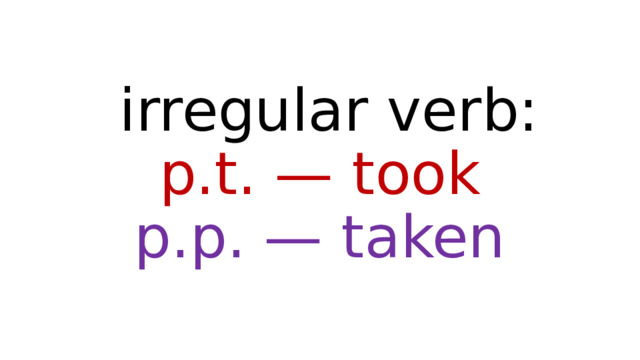
irregular verb: p.t. — took p.p. — taken
![this [ðɪs] эта, это, этот, сей](https://fsd.multiurok.ru/html/2024/05/11/s_663e90c990a3e/img153.jpg)
this [ðɪs] эта, это, этот, сей
![farewell [feəˈwel] прощальный, напутственный, прощание](https://fsd.multiurok.ru/html/2024/05/11/s_663e90c990a3e/img154.jpg)
farewell [feəˈwel] прощальный, напутственный, прощание
![latest [ˈleɪtɪst] последний, поздно, недавно, новинка](https://fsd.multiurok.ru/html/2024/05/11/s_663e90c990a3e/img155.jpg)
latest [ˈleɪtɪst] последний, поздно, недавно, новинка
![late [leɪt] поздний, последний, покойный, поздно, недавно, за последнее время](https://fsd.multiurok.ru/html/2024/05/11/s_663e90c990a3e/img156.jpg)
late [leɪt] поздний, последний, покойный, поздно, недавно, за последнее время
![adieu [əˈdju] a-,-ˈdyü прощай(те) прощание n адью до свидания](https://fsd.multiurok.ru/html/2024/05/11/s_663e90c990a3e/img157.jpg)
adieu [əˈdju] a-,-ˈdyü прощай(те) прощание n адью до свидания
![write [raɪt] писать, записывать, сочинять, выписывать, вводить информацию](https://fsd.multiurok.ru/html/2024/05/11/s_663e90c990a3e/img158.jpg)
write [raɪt] писать, записывать, сочинять, выписывать, вводить информацию
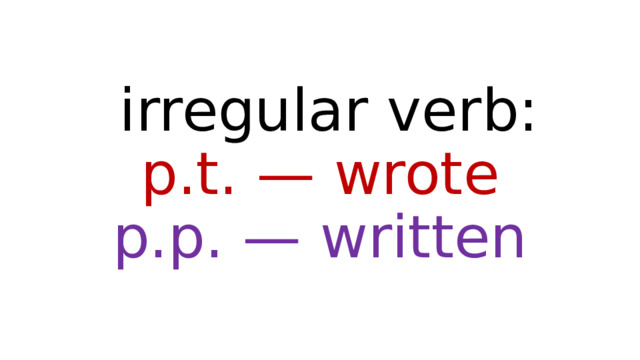
irregular verb: p.t. — wrote p.p. — written
![tomb [tuːm] гробница, могила, склеп, надгробие, смерть, хоронить](https://fsd.multiurok.ru/html/2024/05/11/s_663e90c990a3e/img160.jpg)
tomb [tuːm] гробница, могила, склеп, надгробие, смерть, хоронить

sycamore
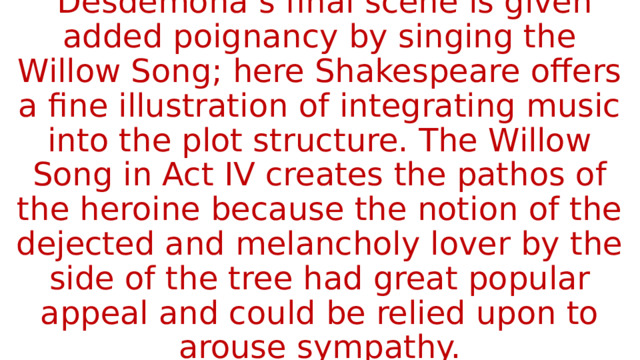
Desdemona’s final scene is given added poignancy by singing the Willow Song; here Shakespeare offers a fine illustration of integrating music into the plot structure. The Willow Song in Act IV creates the pathos of the heroine because the notion of the dejected and melancholy lover by the side of the tree had great popular appeal and could be relied upon to arouse sympathy.
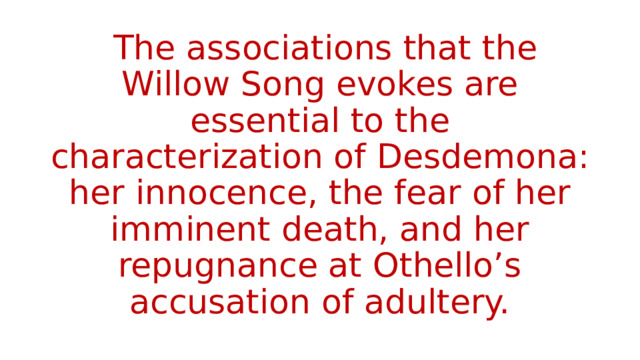
The associations that the Willow Song evokes are essential to the characterization of Desdemona: her innocence, the fear of her imminent death, and her repugnance at Othello’s accusation of adultery.

the Willow Song in Shakespeare’s “Othello”
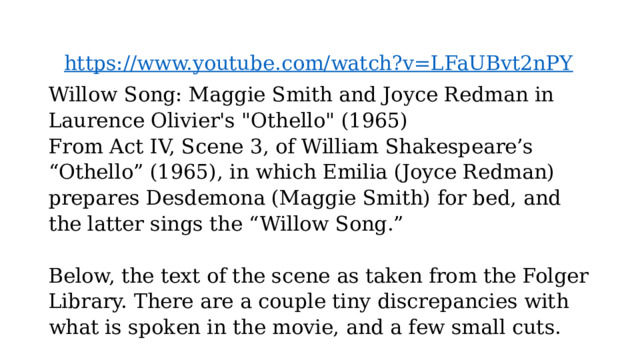
https://www.youtube.com/watch?v=LFaUBvt2nPY Willow Song: Maggie Smith and Joyce Redman in Laurence Olivier's "Othello" (1965) From Act IV, Scene 3, of William Shakespeare’s “Othello” (1965), in which Emilia (Joyce Redman) prepares Desdemona (Maggie Smith) for bed, and the latter sings the “Willow Song.” Below, the text of the scene as taken from the Folger Library. There are a couple tiny discrepancies with what is spoken in the movie, and a few small cuts.
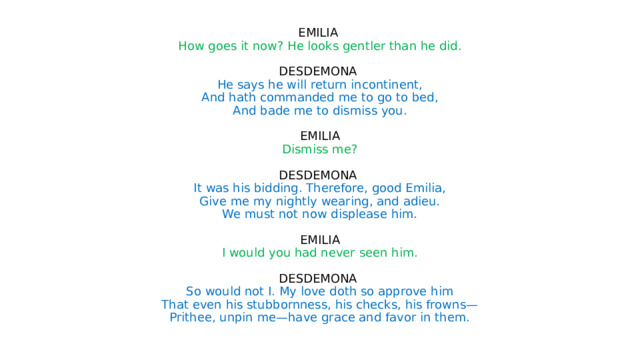
EMILIA How goes it now? He looks gentler than he did. DESDEMONA He says he will return incontinent, And hath commanded me to go to bed, And bade me to dismiss you. EMILIA Dismiss me? DESDEMONA It was his bidding. Therefore, good Emilia, Give me my nightly wearing, and adieu. We must not now displease him. EMILIA I would you had never seen him. DESDEMONA So would not I. My love doth so approve him That even his stubbornness, his checks, his frowns— Prithee, unpin me—have grace and favor in them.
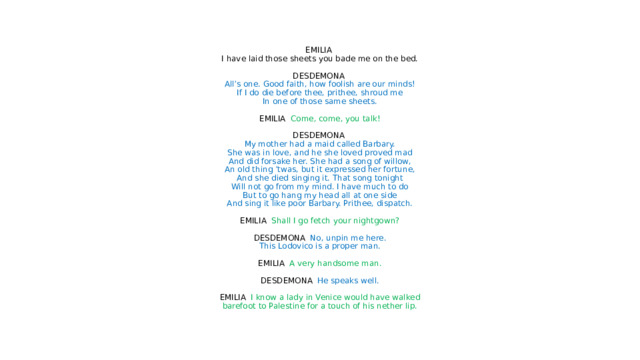
EMILIA I have laid those sheets you bade me on the bed. DESDEMONA All’s one. Good faith, how foolish are our minds! If I do die before thee, prithee, shroud me In one of those same sheets. EMILIA Come, come, you talk! DESDEMONA My mother had a maid called Barbary. She was in love, and he she loved proved mad And did forsake her. She had a song of willow, An old thing ’twas, but it expressed her fortune, And she died singing it. That song tonight Will not go from my mind. I have much to do But to go hang my head all at one side And sing it like poor Barbary. Prithee, dispatch. EMILIA Shall I go fetch your nightgown? DESDEMONA No, unpin me here. This Lodovico is a proper man. EMILIA A very handsome man. DESDEMONA He speaks well. EMILIA I know a lady in Venice would have walked barefoot to Palestine for a touch of his nether lip.
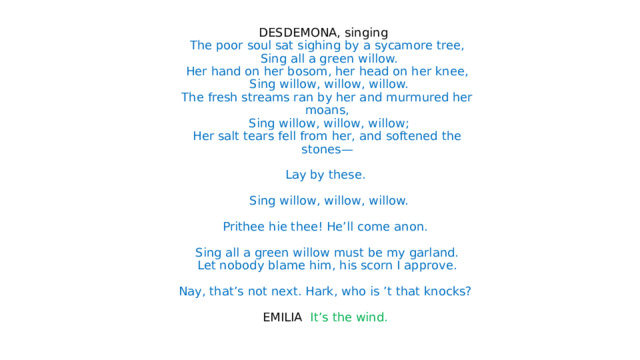
DESDEMONA, singing The poor soul sat sighing by a sycamore tree, Sing all a green willow. Her hand on her bosom, her head on her knee, Sing willow, willow, willow. The fresh streams ran by her and murmured her moans, Sing willow, willow, willow; Her salt tears fell from her, and softened the stones— Lay by these. Sing willow, willow, willow. Prithee hie thee! He’ll come anon. Sing all a green willow must be my garland. Let nobody blame him, his scorn I approve. Nay, that’s not next. Hark, who is ’t that knocks? EMILIA It’s the wind.
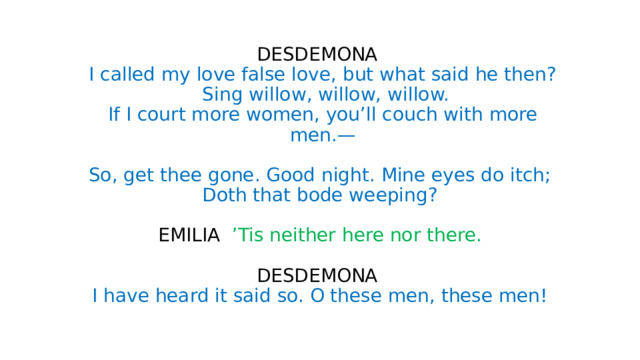
DESDEMONA I called my love false love, but what said he then? Sing willow, willow, willow. If I court more women, you’ll couch with more men.— So, get thee gone. Good night. Mine eyes do itch; Doth that bode weeping? EMILIA ’Tis neither here nor there. DESDEMONA I have heard it said so. O these men, these men!
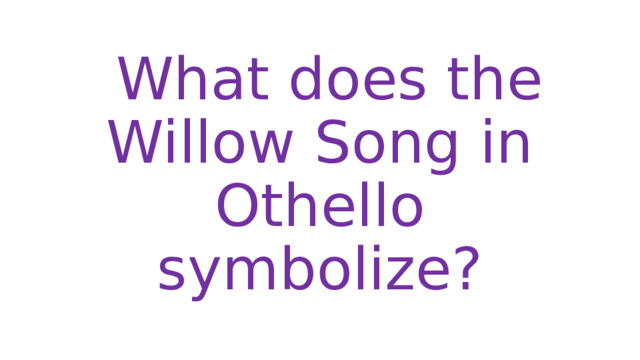
What does the Willow Song in Othello symbolize?
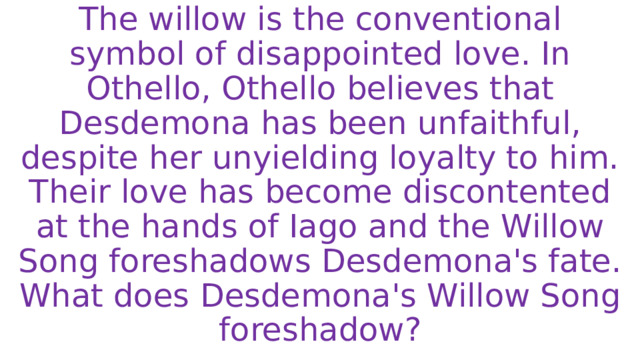
The willow is the conventional symbol of disappointed love. In Othello, Othello believes that Desdemona has been unfaithful, despite her unyielding loyalty to him. Their love has become discontented at the hands of Iago and the Willow Song foreshadows Desdemona's fate. What does Desdemona's Willow Song foreshadow?
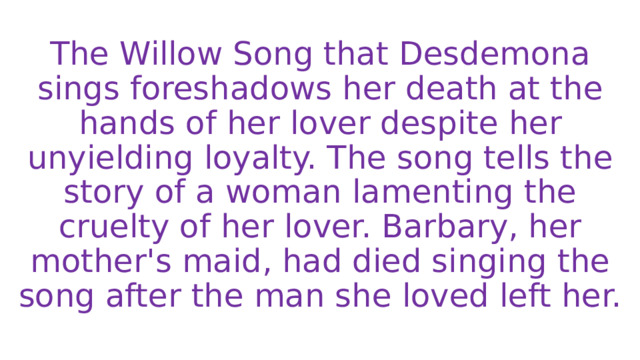
The Willow Song that Desdemona sings foreshadows her death at the hands of her lover despite her unyielding loyalty. The song tells the story of a woman lamenting the cruelty of her lover. Barbary, her mother's maid, had died singing the song after the man she loved left her.
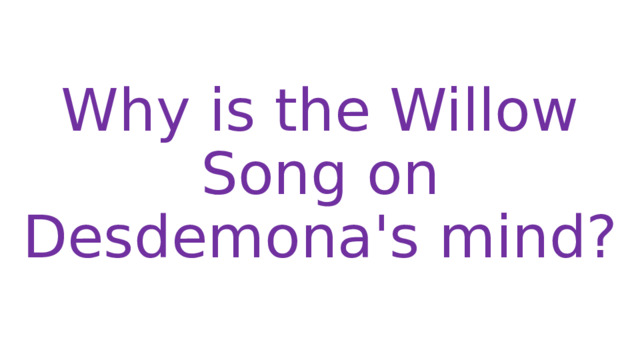
Why is the Willow Song on Desdemona's mind?
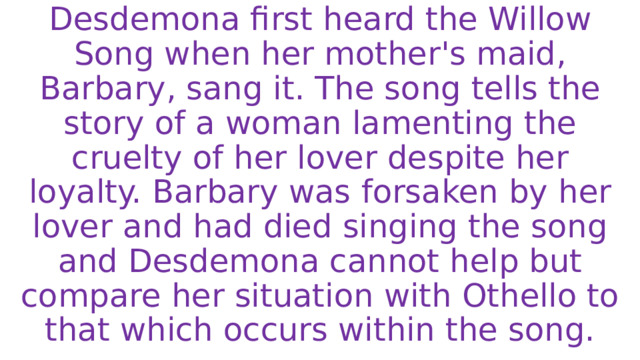
Desdemona first heard the Willow Song when her mother's maid, Barbary, sang it. The song tells the story of a woman lamenting the cruelty of her lover despite her loyalty. Barbary was forsaken by her lover and had died singing the song and Desdemona cannot help but compare her situation with Othello to that which occurs within the song.

William Shakespeare's Othello is a famous example of one of his tragic plays. In the play, Othello has been deceived into believing his wife, Desdemona, is being unfaithful. The play depicts Othello's downward spiral as Iago, furious at being passed over for a promotion that was given to Cassio, takes his revenge on the two men by convincing Othello that his wife is sleeping with Cassio. Othello quickly loses his mind as a result of his jealousy and ultimately kills Desdemona before realizing his mistake and subsequently killing himself.
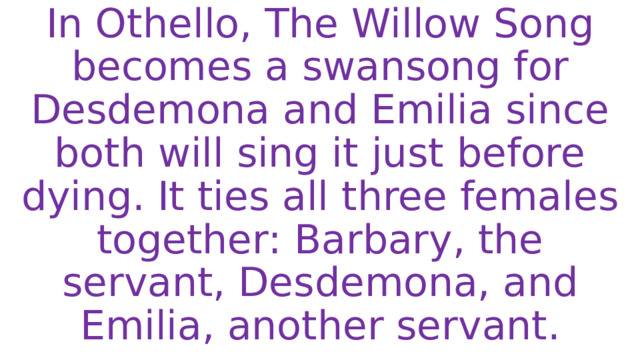
In Othello, The Willow Song becomes a swansong for Desdemona and Emilia since both will sing it just before dying. It ties all three females together: Barbary, the servant, Desdemona, and Emilia, another servant.
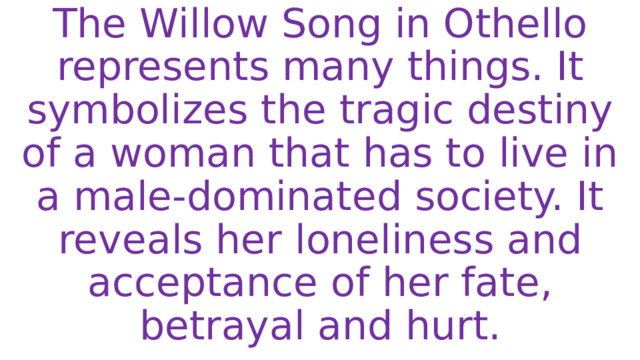
The Willow Song in Othello represents many things. It symbolizes the tragic destiny of a woman that has to live in a male-dominated society. It reveals her loneliness and acceptance of her fate, betrayal and hurt.

The earliest song featuring weeping under willows is an ancient one, Psalm 137.
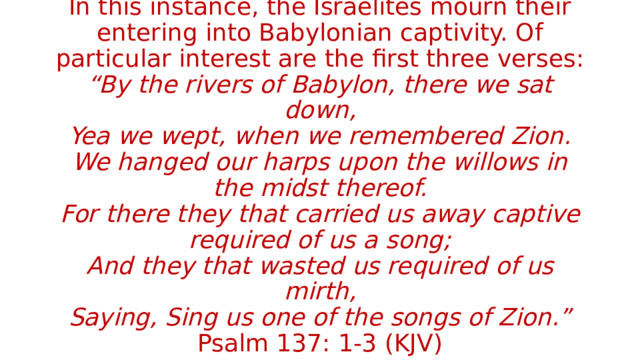
In this instance, the Israelites mourn their entering into Babylonian captivity. Of particular interest are the first three verses: “By the rivers of Babylon, there we sat down, Yea we wept, when we remembered Zion. We hanged our harps upon the willows in the midst thereof. For there they that carried us away captive required of us a song; And they that wasted us required of us mirth, Saying, Sing us one of the songs of Zion.” Psalm 137: 1-3 (KJV)
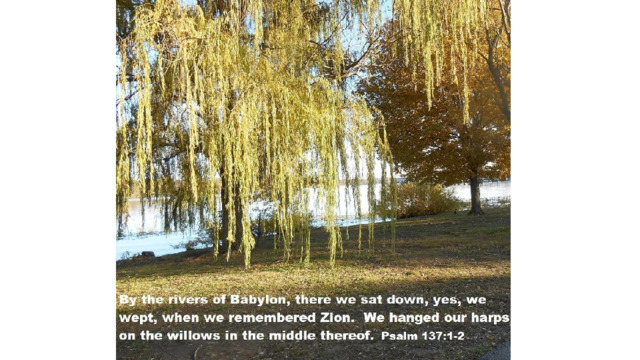
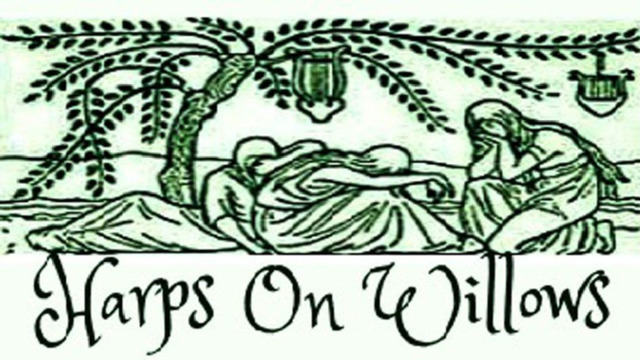

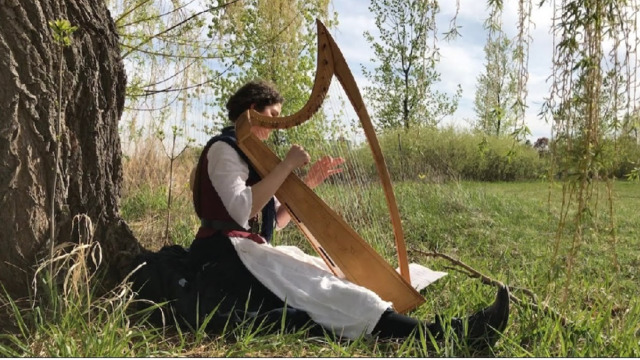

Frank Zimmerman The Israelites hang their Harps on the Willow Trees in Babylon
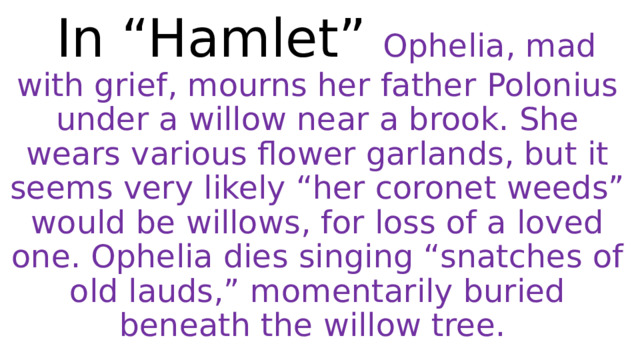
In “Hamlet” Ophelia, mad with grief, mourns her father Polonius under a willow near a brook. She wears various flower garlands, but it seems very likely “her coronet weeds” would be willows, for loss of a loved one. Ophelia dies singing “snatches of old lauds,” momentarily buried beneath the willow tree.
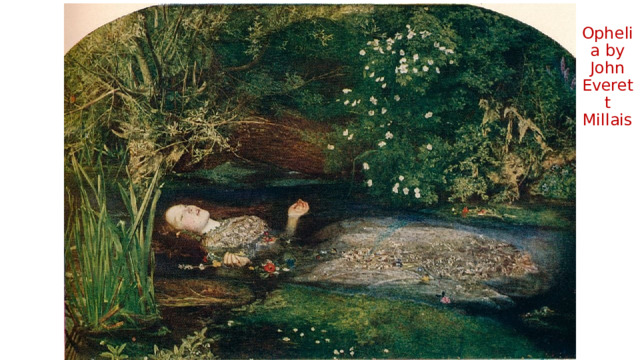
Ophelia by John Everett Millais
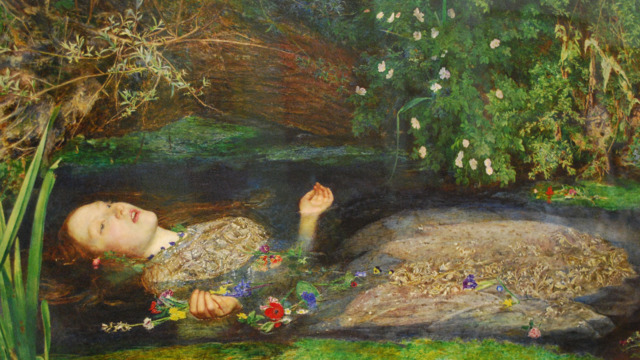
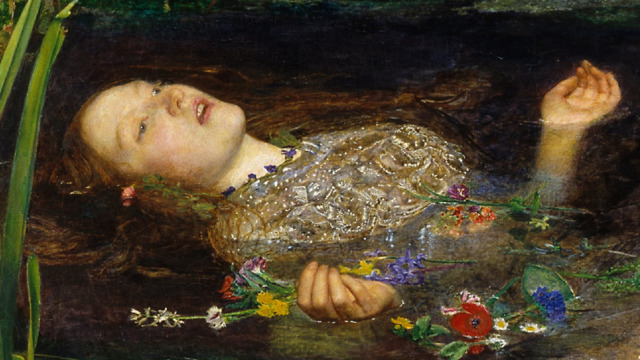
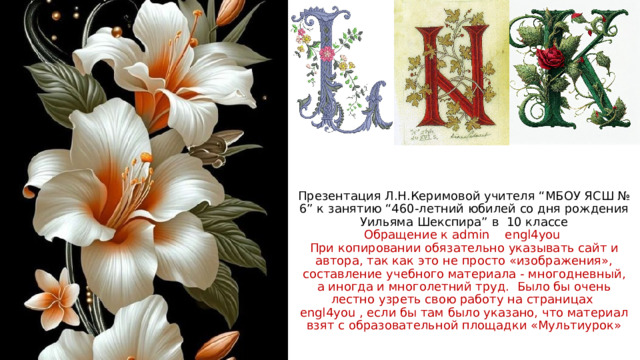
Презентация Л.Н.Керимовой учителя “МБОУ ЯСШ № 6” к занятию “460-летний юбилей со дня рождения Уильяма Шекспира” в 10 классе Обращение к admin engl4you При копировании обязательно указывать сайт и автора, так как это не просто «изображения», составление учебного материала - многодневный, а иногда и многолетний труд. Было бы очень лестно узреть свою работу на страницах engl4you , если бы там было указано, что материал взят с образовательной площадки «Мультиурок»






























![the [ðə] тот, такой, этот, тем](https://fsd.multiurok.ru/html/2024/05/11/s_663e90c990a3e/img25.jpg)
![poor [pʊə(r)] бедный, несчастный](https://fsd.multiurok.ru/html/2024/05/11/s_663e90c990a3e/img26.jpg)
![soul [səʊl] душа, дух, сердце, человек](https://fsd.multiurok.ru/html/2024/05/11/s_663e90c990a3e/img27.jpg)
![sat [sæt] сидел](https://fsd.multiurok.ru/html/2024/05/11/s_663e90c990a3e/img28.jpg)
![sit [sɪt] сидеть, заседать, находиться, просиживать, стоять, позировать, сажать, усаживать](https://fsd.multiurok.ru/html/2024/05/11/s_663e90c990a3e/img29.jpg)
![sighing [saɪɪŋ] вздыхая](https://fsd.multiurok.ru/html/2024/05/11/s_663e90c990a3e/img30.jpg)
![sigh [saɪ] вздыхать, охать, тосковать](https://fsd.multiurok.ru/html/2024/05/11/s_663e90c990a3e/img31.jpg)
![by [baɪ] по, на, к, при, у, мимо, согласно, около, рядом с, близко](https://fsd.multiurok.ru/html/2024/05/11/s_663e90c990a3e/img32.jpg)
![a [ə] неопределённый артикль, один](https://fsd.multiurok.ru/html/2024/05/11/s_663e90c990a3e/img33.jpg)
![sycamore [ˈsɪkəmɔː] платан, явор, чинар, чинара, сикамор, клен явор](https://fsd.multiurok.ru/html/2024/05/11/s_663e90c990a3e/img34.jpg)
![tree [triː] дерево, древо, вал, родословное дерево, загнать на дерево, влезать на дерево](https://fsd.multiurok.ru/html/2024/05/11/s_663e90c990a3e/img35.jpg)
![singing [sɪŋɪŋ] напевая](https://fsd.multiurok.ru/html/2024/05/11/s_663e90c990a3e/img36.jpg)
![sing [sɪŋ] петь, спеть, воспевать, ликовать, пение, свист, спевка, шум, звон](https://fsd.multiurok.ru/html/2024/05/11/s_663e90c990a3e/img37.jpg)
![willow [ˈwɪləʊ] ива, тальник](https://fsd.multiurok.ru/html/2024/05/11/s_663e90c990a3e/img38.jpg)
![her [hə(r] ее, ей, свой, принадлежащий ей](https://fsd.multiurok.ru/html/2024/05/11/s_663e90c990a3e/img39.jpg)
![hand [hænd] рука (кисть)](https://fsd.multiurok.ru/html/2024/05/11/s_663e90c990a3e/img40.jpg)
![in [ɪn] в, на, по, во, при, с, у, из, внутри, внутрь, связи, влияние](https://fsd.multiurok.ru/html/2024/05/11/s_663e90c990a3e/img41.jpg)
![bosom [ˈbʊz(ə)m] грудь, пазуха, сердце, душа, хранить в тайне, прятать за пазуху](https://fsd.multiurok.ru/html/2024/05/11/s_663e90c990a3e/img42.jpg)
![head [hed] голова](https://fsd.multiurok.ru/html/2024/05/11/s_663e90c990a3e/img43.jpg)
![on [ɒn] на, по, о, в, об, согласно, левая сторона](https://fsd.multiurok.ru/html/2024/05/11/s_663e90c990a3e/img44.jpg)
![knee [niː] колено, коленка](https://fsd.multiurok.ru/html/2024/05/11/s_663e90c990a3e/img45.jpg)
![Oh [əʊ] издавать восклицание «о»](https://fsd.multiurok.ru/html/2024/05/11/s_663e90c990a3e/img46.jpg)
![she [ʃɪ] она, та, которая, женщина](https://fsd.multiurok.ru/html/2024/05/11/s_663e90c990a3e/img47.jpg)
![sighed [saɪd] вздыхала, охала, тосковала](https://fsd.multiurok.ru/html/2024/05/11/s_663e90c990a3e/img48.jpg)
![and [ənd] и, а, но, иначе](https://fsd.multiurok.ru/html/2024/05/11/s_663e90c990a3e/img49.jpg)
![made [meɪd] издавала](https://fsd.multiurok.ru/html/2024/05/11/s_663e90c990a3e/img50.jpg)
![make [meɪk] - делать; изготовлять, производить - составлять - создавать, творить](https://fsd.multiurok.ru/html/2024/05/11/s_663e90c990a3e/img51.jpg)
![great [ɡreɪt] большой, великий](https://fsd.multiurok.ru/html/2024/05/11/s_663e90c990a3e/img52.jpg)
![moan [məʊn] стон, жалоба, стонать, жаловаться, охать](https://fsd.multiurok.ru/html/2024/05/11/s_663e90c990a3e/img53.jpg)
![I [aɪ] я (местоимение)](https://fsd.multiurok.ru/html/2024/05/11/s_663e90c990a3e/img54.jpg)
!['m [əm] 1-е л. ед. ч. настоящего времени гл. be быть, находиться, существовать](https://fsd.multiurok.ru/html/2024/05/11/s_663e90c990a3e/img55.jpg)
![dead [ded] мертвый, умерший](https://fsd.multiurok.ru/html/2024/05/11/s_663e90c990a3e/img56.jpg)
![to [tə] для, к, в, на, до](https://fsd.multiurok.ru/html/2024/05/11/s_663e90c990a3e/img57.jpg)
![all [ɔːl] все, весь, целый, все, целое, все, весь, вся, совершенно, всецело](https://fsd.multiurok.ru/html/2024/05/11/s_663e90c990a3e/img58.jpg)
![pleasure [ˈpleʒə] удовольствие, наслаждение, увеселительный](https://fsd.multiurok.ru/html/2024/05/11/s_663e90c990a3e/img59.jpg)
![my [maɪ] мой, моя, мое, мои, свой, свое, принадлежащий мне](https://fsd.multiurok.ru/html/2024/05/11/s_663e90c990a3e/img60.jpg)
![true [truː] истинный, верный, истина, точно, правдиво](https://fsd.multiurok.ru/html/2024/05/11/s_663e90c990a3e/img61.jpg)
![love [lʌv] любовь, влюбленность, любить, возлюбить, любовный, возлюбленный](https://fsd.multiurok.ru/html/2024/05/11/s_663e90c990a3e/img62.jpg)
![is [ɪz] 3-е л. ед. ч. настоящего времени глагола be быть, находиться, составлять, происходить, существовать, равняться, стоить, бывать](https://fsd.multiurok.ru/html/2024/05/11/s_663e90c990a3e/img63.jpg)
![gone [ɡɒn] ушедший, прошедший, уехавший, потерянный](https://fsd.multiurok.ru/html/2024/05/11/s_663e90c990a3e/img64.jpg)
![shall [ʃəl] в 1-м лице выражает волю говорящего, его приказ, обещание - во 2-м и 3-м лице выражает - волю говорящего, его приказ, распоряжение и т. п.: - обещание, угрозу и т. п.: - выражает желательность или обязательность действия: - в текстах законов, соглашений, приказов и т. п. выражает долженствование и часто соответствует настоящему времени: - употребляется в предсказаниях, пророчествах и т. п.: - с личным местоимением 1-го лица выражает решимость: - вспомогательный глагол служит для образования формы будущего времени в 1-м лице в утвердительных и отрицательных предложениях и в 1-м и 2-м лице в вопросительных предложениях](https://fsd.multiurok.ru/html/2024/05/11/s_663e90c990a3e/img65.jpg)
![be [bɪ] быть](https://fsd.multiurok.ru/html/2024/05/11/s_663e90c990a3e/img66.jpg)
![garland [ˈɡɑːlənd] гирлянда, венок, пальма первенства, плести венок, украшать венком](https://fsd.multiurok.ru/html/2024/05/11/s_663e90c990a3e/img67.jpg)
![fresh [freʃ] свежий, новый, недавно, прохлада, половодье, свежеть](https://fsd.multiurok.ru/html/2024/05/11/s_663e90c990a3e/img68.jpg)
![streams [striːmz] ручьи, реки](https://fsd.multiurok.ru/html/2024/05/11/s_663e90c990a3e/img69.jpg)
![stream [striːm] поток, ручей, струя, река](https://fsd.multiurok.ru/html/2024/05/11/s_663e90c990a3e/img70.jpg)
![ran [ræn] бежал](https://fsd.multiurok.ru/html/2024/05/11/s_663e90c990a3e/img71.jpg)
![run [rʌn] работать, бежать, управлять, бегать, прогон, работа, бег, пробег, ход, показ, трасса](https://fsd.multiurok.ru/html/2024/05/11/s_663e90c990a3e/img72.jpg)

![murmured [ˈmɜːməd] шептал, бормотал](https://fsd.multiurok.ru/html/2024/05/11/s_663e90c990a3e/img74.jpg)
![murmur [ˈmɜːmə] роптать, бормотать, шептать, журчать, ропот, журчание, шепот, ворчание, шорох](https://fsd.multiurok.ru/html/2024/05/11/s_663e90c990a3e/img75.jpg)
![moans [məʊnz] стоны](https://fsd.multiurok.ru/html/2024/05/11/s_663e90c990a3e/img76.jpg)
![salt [sɔːlt] соль, поваренная соль, солить, засаливать, соленый, морской](https://fsd.multiurok.ru/html/2024/05/11/s_663e90c990a3e/img77.jpg)
![tears [ˈtɪəz] слёзы](https://fsd.multiurok.ru/html/2024/05/11/s_663e90c990a3e/img78.jpg)
![fell [fel] падали](https://fsd.multiurok.ru/html/2024/05/11/s_663e90c990a3e/img79.jpg)
![fall [fɔːl] падение, осень, снижение, спад, выпадение, падать, снижаться, опускаться, впадать](https://fsd.multiurok.ru/html/2024/05/11/s_663e90c990a3e/img80.jpg)

![from [frəm] от, из, с, судя по](https://fsd.multiurok.ru/html/2024/05/11/s_663e90c990a3e/img82.jpg)
![soften'd [ˈsɒf(ə)n] расплавляли](https://fsd.multiurok.ru/html/2024/05/11/s_663e90c990a3e/img83.jpg)
![soften [ˈsɒf(ə)n] смягчать, смягчаться, размягчать, размягчаться, мягчить, размякать, мякнуть](https://fsd.multiurok.ru/html/2024/05/11/s_663e90c990a3e/img84.jpg)
![stones [stones] камни](https://fsd.multiurok.ru/html/2024/05/11/s_663e90c990a3e/img85.jpg)
![stone [stəʊn] каменный, камень, стоун, камешек, побивать камнями](https://fsd.multiurok.ru/html/2024/05/11/s_663e90c990a3e/img86.jpg)
![come [kʌm] приходить, приехать, приезжать, прибывать, наступить, происходить, подходить](https://fsd.multiurok.ru/html/2024/05/11/s_663e90c990a3e/img87.jpg)
![you [ju] вы, вам, вами, вас, ты, тебя, тебе, тобой](https://fsd.multiurok.ru/html/2024/05/11/s_663e90c990a3e/img88.jpg)
![forsaken [fəˈseɪkən] покинутый, брошенный](https://fsd.multiurok.ru/html/2024/05/11/s_663e90c990a3e/img89.jpg)
![forsake [fəˈseɪk] оставлять, отказываться, покидать](https://fsd.multiurok.ru/html/2024/05/11/s_663e90c990a3e/img90.jpg)

![mourn [mɔːn] оплакивать, скорбеть, горевать, печалиться, сетовать, носить траур](https://fsd.multiurok.ru/html/2024/05/11/s_663e90c990a3e/img92.jpg)
![with [wɪð] с, вместе с, от, несмотря на](https://fsd.multiurok.ru/html/2024/05/11/s_663e90c990a3e/img93.jpg)
![me [mɪ] меня, мне, мной, себя](https://fsd.multiurok.ru/html/2024/05/11/s_663e90c990a3e/img94.jpg)
![who [huː] кто, который, те, кто, тот, кто](https://fsd.multiurok.ru/html/2024/05/11/s_663e90c990a3e/img95.jpg)
![speaks [spiːks] говорит](https://fsd.multiurok.ru/html/2024/05/11/s_663e90c990a3e/img96.jpg)
![speak [spiːk] говорить, выступать, разговаривать, высказывать(ся), изъясняться](https://fsd.multiurok.ru/html/2024/05/11/s_663e90c990a3e/img97.jpg)
![of [əv] из, от, о, об, для](https://fsd.multiurok.ru/html/2024/05/11/s_663e90c990a3e/img98.jpg)
![false [fɔːls] ложный, фальшивый, неправильный, лживый, ошибочный, искусственный, подставной](https://fsd.multiurok.ru/html/2024/05/11/s_663e90c990a3e/img99.jpg)
![mine [maɪn] мой, моя, мое, мои, шахта, рудник, мина, добывать, минный](https://fsd.multiurok.ru/html/2024/05/11/s_663e90c990a3e/img100.jpg)
!['s = is [z] есть, находится, существует](https://fsd.multiurok.ru/html/2024/05/11/s_663e90c990a3e/img101.jpg)
![is [ɪz] есть, находится, существует](https://fsd.multiurok.ru/html/2024/05/11/s_663e90c990a3e/img102.jpg)
![falser [ˈfɔːlsə] более неверный, более лживый](https://fsd.multiurok.ru/html/2024/05/11/s_663e90c990a3e/img103.jpg)
![than [ðən] чем, кроме, как, чтобы](https://fsd.multiurok.ru/html/2024/05/11/s_663e90c990a3e/img104.jpg)
![he [hɪ] он, него, мужчина, водящий](https://fsd.multiurok.ru/html/2024/05/11/s_663e90c990a3e/img105.jpg)
![let [let] позволять, давать, препятствовать, препятствие, помеха, сдача внаем](https://fsd.multiurok.ru/html/2024/05/11/s_663e90c990a3e/img106.jpg)
![no [nəʊ] нет, не, никакой, нисколько не, отказ, отрицание](https://fsd.multiurok.ru/html/2024/05/11/s_663e90c990a3e/img107.jpg)
![more [mɔː] более, больше, еще, гораздо, больший, дополнительный, большее количество](https://fsd.multiurok.ru/html/2024/05/11/s_663e90c990a3e/img108.jpg)
![boast [bəʊst] похвастать, хвастать, хвастаться, хвастовство, предмет гордости](https://fsd.multiurok.ru/html/2024/05/11/s_663e90c990a3e/img109.jpg)
![palace [ˈpælɪs] дворец, чертог, особняк, роскошное здание, дворцовый](https://fsd.multiurok.ru/html/2024/05/11/s_663e90c990a3e/img110.jpg)
![nor [nɔː] ни, и ... не, тоже ... не, также ... не](https://fsd.multiurok.ru/html/2024/05/11/s_663e90c990a3e/img111.jpg)
![bower [ˈbaʊə|] беседка, дача, жилище, будуар, осенять, окружать](https://fsd.multiurok.ru/html/2024/05/11/s_663e90c990a3e/img112.jpg)
![it [ɪt] это, этого, он, она, оно, него, последнее слово, идеал](https://fsd.multiurok.ru/html/2024/05/11/s_663e90c990a3e/img113.jpg)
![buds [bʌdz] распускается бутон](https://fsd.multiurok.ru/html/2024/05/11/s_663e90c990a3e/img114.jpg)
![bud [bʌd] бутон, почка, приятель, дружище, крошка, почковаться, развиваться](https://fsd.multiurok.ru/html/2024/05/11/s_663e90c990a3e/img115.jpg)
![but [bət] но, а, однако, зато, кроме, только, кроме, возражение, кто бы не](https://fsd.multiurok.ru/html/2024/05/11/s_663e90c990a3e/img116.jpg)
![blasteth ===blasts [blɑːsts] разрушает](https://fsd.multiurok.ru/html/2024/05/11/s_663e90c990a3e/img117.jpg)
![blast [blɑːst] взрыв, дутье, звук, взрывная волна, дуть, взрывать, разносить, разрушать](https://fsd.multiurok.ru/html/2024/05/11/s_663e90c990a3e/img118.jpg)
![ere [eə] прежде чем, скорее чем, до, перед, рано](https://fsd.multiurok.ru/html/2024/05/11/s_663e90c990a3e/img119.jpg)
![flower [ˈflaʊə] цветок, цвет, цветение, расцвет, цвести, быть в расцвете](https://fsd.multiurok.ru/html/2024/05/11/s_663e90c990a3e/img120.jpg)
![though [ðəʊ] хотя, однако, несмотря на, если бы, однако, все же](https://fsd.multiurok.ru/html/2024/05/11/s_663e90c990a3e/img121.jpg)
![fair [feə] справедливый, честный, честно, ясно, чисто, точно](https://fsd.multiurok.ru/html/2024/05/11/s_663e90c990a3e/img122.jpg)
![die [daɪ] умереть, умирать](https://fsd.multiurok.ru/html/2024/05/11/s_663e90c990a3e/img123.jpg)
![thy [ˈðaɪ] твой, твоя, твое, твои](https://fsd.multiurok.ru/html/2024/05/11/s_663e90c990a3e/img124.jpg)
![wound [wuːnd] рана, ранение, обида, ущерб, оскорбление, ранить, поранить, причинять боль](https://fsd.multiurok.ru/html/2024/05/11/s_663e90c990a3e/img125.jpg)
![thou [ðaʊ] pers pron уст., поэт. ты](https://fsd.multiurok.ru/html/2024/05/11/s_663e90c990a3e/img126.jpg)
![has [həz] иметь, обладать, получать, содержать, испытывать, проводить, знать, родить, говорить](https://fsd.multiurok.ru/html/2024/05/11/s_663e90c990a3e/img127.jpg)
![lost [lɒst] - потерянный, утраченный, пропавший - напрасный; даром потраченный - погибший - заблудившийся - неиспользованный, пропущенный - (in) забывшийся - (to) безразличный - проигранный - поэт. потерпевший поражение, разбитый](https://fsd.multiurok.ru/html/2024/05/11/s_663e90c990a3e/img128.jpg)

![lose [luːz] терять, проигрывать, упускать, утрачивать, лишаться, лишать, забывать, заблудиться](https://fsd.multiurok.ru/html/2024/05/11/s_663e90c990a3e/img130.jpg)
![truest [ˈtruːɪst|] самый верный](https://fsd.multiurok.ru/html/2024/05/11/s_663e90c990a3e/img131.jpg)
![true [truː] истинный, верный, истина, правдиво](https://fsd.multiurok.ru/html/2024/05/11/s_663e90c990a3e/img132.jpg)
![lover [ˈlʌvə] любовник, любитель, возлюбленный, поклонник, друг, приверженец, доброжелатель](https://fsd.multiurok.ru/html/2024/05/11/s_663e90c990a3e/img133.jpg)
![that [ðæt] что, чтобы, который, то, тот, та, так, до такой степени](https://fsd.multiurok.ru/html/2024/05/11/s_663e90c990a3e/img134.jpg)
![goes [ɡəʊz] идёт](https://fsd.multiurok.ru/html/2024/05/11/s_663e90c990a3e/img135.jpg)
![go [ɡəʊ] идти, ехать, ходить, переходить, ездить, ход, движение, попытка, ходьба](https://fsd.multiurok.ru/html/2024/05/11/s_663e90c990a3e/img136.jpg)
![upon [əˈpɒn] на, по, после, в, о, за, об, относительно, во время, из, у, в течение, касательно](https://fsd.multiurok.ru/html/2024/05/11/s_663e90c990a3e/img137.jpg)
![ground [ɡraʊnd] земля, заземление, молотый, грунтовой, заземлять, основывать](https://fsd.multiurok.ru/html/2024/05/11/s_663e90c990a3e/img138.jpg)
![nobody [ˈnəʊbədɪ] никто, никому не известный человек](https://fsd.multiurok.ru/html/2024/05/11/s_663e90c990a3e/img139.jpg)
![chide [tʃaɪd] упрекать, бранить, журить, шуметь, выть](https://fsd.multiurok.ru/html/2024/05/11/s_663e90c990a3e/img140.jpg)
![him [hɪm] его, ему](https://fsd.multiurok.ru/html/2024/05/11/s_663e90c990a3e/img141.jpg)
![his [hɪz] его, свое, свой, принадлежащий ему](https://fsd.multiurok.ru/html/2024/05/11/s_663e90c990a3e/img142.jpg)
![scorns [skɔːnz] пренебрежение, насмешки](https://fsd.multiurok.ru/html/2024/05/11/s_663e90c990a3e/img143.jpg)
![scorn [skɔːn] презрение, пренебрежение, насмешка, презирать](https://fsd.multiurok.ru/html/2024/05/11/s_663e90c990a3e/img144.jpg)
![approve [əˈpruːv] утверждать, одобрять, санкционировать, апробировать, показывать, проявлять](https://fsd.multiurok.ru/html/2024/05/11/s_663e90c990a3e/img145.jpg)
![was [wəz] 1-е и 3-е лицо единственного числа прошедшего времени глагола be был, была, было; быть, находиться, составлять, происходить, существовать, равняться, стоить, бывать](https://fsd.multiurok.ru/html/2024/05/11/s_663e90c990a3e/img146.jpg)
![born [bɔːn] родившийся, рожденный, прирожденный, ограниченный, с узким кругозором](https://fsd.multiurok.ru/html/2024/05/11/s_663e90c990a3e/img147.jpg)
![p. p. от bear [beə] нести, иметь, носить, переносить, терпеть](https://fsd.multiurok.ru/html/2024/05/11/s_663e90c990a3e/img148.jpg)
![to [tə] для, к, в, на, до, телеграфная контора](https://fsd.multiurok.ru/html/2024/05/11/s_663e90c990a3e/img149.jpg)
![for [fə(r)] для, на, за, в, к, в течение, от, ради, из-за, вместо, ибо, ввиду того, что](https://fsd.multiurok.ru/html/2024/05/11/s_663e90c990a3e/img150.jpg)
![take [teɪk] принимать, брать, считать, занимать](https://fsd.multiurok.ru/html/2024/05/11/s_663e90c990a3e/img151.jpg)

![this [ðɪs] эта, это, этот, сей](https://fsd.multiurok.ru/html/2024/05/11/s_663e90c990a3e/img153.jpg)
![farewell [feəˈwel] прощальный, напутственный, прощание](https://fsd.multiurok.ru/html/2024/05/11/s_663e90c990a3e/img154.jpg)
![latest [ˈleɪtɪst] последний, поздно, недавно, новинка](https://fsd.multiurok.ru/html/2024/05/11/s_663e90c990a3e/img155.jpg)
![late [leɪt] поздний, последний, покойный, поздно, недавно, за последнее время](https://fsd.multiurok.ru/html/2024/05/11/s_663e90c990a3e/img156.jpg)
![adieu [əˈdju] a-,-ˈdyü прощай(те) прощание n адью до свидания](https://fsd.multiurok.ru/html/2024/05/11/s_663e90c990a3e/img157.jpg)
![write [raɪt] писать, записывать, сочинять, выписывать, вводить информацию](https://fsd.multiurok.ru/html/2024/05/11/s_663e90c990a3e/img158.jpg)

![tomb [tuːm] гробница, могила, склеп, надгробие, смерть, хоронить](https://fsd.multiurok.ru/html/2024/05/11/s_663e90c990a3e/img160.jpg)














































